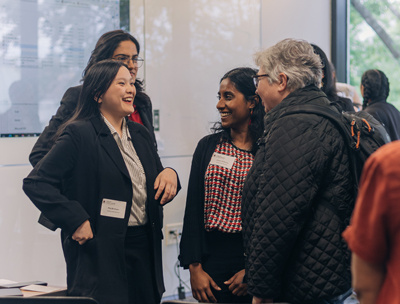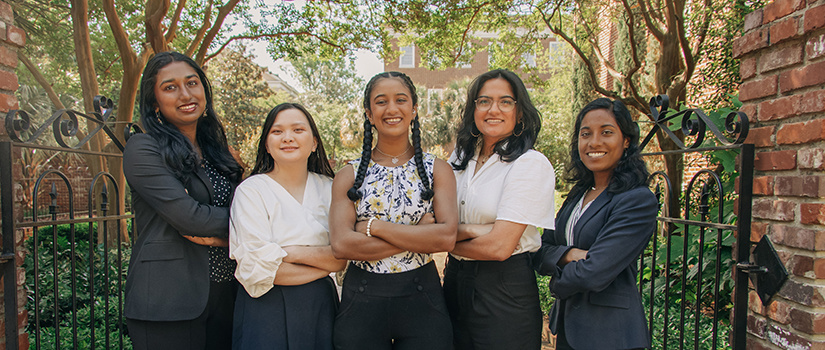Top photo: College of Engineering and Computing seniors: (l to r) Siri Avula, Ashley Bickham, Tanvi Singh, Mahi Patel and Vivian D'Souza.
What if your Spotify playlist could help you learn another language? Thanks to the Lyraquist app, developed by five College of Engineering and Computing seniors, that possibility will soon be a reality.
At the South Carolina Honors College Thesis Symposium on Friday, April 12, Siri Avula, Ashley Bickham, Vivian D’Souza, Mahi Patel and Tanvi Singh unveiled their CEC capstone project: the Lyraquist app. The five women, four of whom—Avula, D’Souza, Patel and Singh—are Honors students, designed Lyraquist to sync with a user’s Spotify Premium playlist. As users listen to songs in French, German and Spanish, the app utilizes Google translate to offer word-for-word English translations of the lyrics.
“Anyone can be a lyrical linguist.”

The Lyraquist logo, an LP record emblazoned with a world map, offers some insight into the inspiration and ethos behind the project.
D’Souza, who studied abroad in Ireland, has fond memories of connecting with students from around the world through music. She and her classmates would gather in common areas in the evenings and share songs with lyrics in a variety of languages. D’Souza mentioned how this practice helped her learn more about her classmates, their cultures and the languages they spoke.
Four of the five Lyraquist team members studied abroad during their time at USC, and all team members grew up in multilingual households. Using the knowledge gleaned from their computer science classes, the team sought to create an app that would emulate their language-sharing experiences and provide insight into other cultures.
“Our budget was zero dollars.”
The team, who met through their computer science classes, worked together for two semesters to develop, code and test the app. D’Souza and Patel mentioned that, initially, the team progressed in perfect sync. But as coding began and each member took on their own portion of the project, the team had some non-technical bugs to work out.
This inspired the team to implement weekly stand-up meetings, a common practice in professional tech teams, providing time for each member to give a progress update. This approach, combined with the project management program Trello, helped the team stay on track as they navigated platforms and software such as React Native, Javascript, Expo and the Musixmatch lyrics database to create Lyraquist.
Above all, the team strove for the app to abide by music copyright laws and ethical guidelines. Though they had no funding, they utilized open-access sources to provide users with the best in-app experience possible.
Dr. Jose Vidal, who served as the team’s capstone project director, attested to the team’s quality work. He was impressed by “how they were able to combine all the various third-party APIs [application program interfaces]: Spotify, Musicmatch, Google Translate, Lexicala, Expo Speech, into one cohesive and fun to use app.”

“Customize their own learning journey.”
Within the app, users take charge of their learning experience. Unlike many language-learning apps that are lesson-based, Lyraquist allows users to choose the songs that they want to hear. As they listen, they can click on words in the lyrics to learn their definitions. Users can then add vocabulary to in-app workbooks, save songs for later study and “star” particular languages that they want to focus on.
If users are unsure of where to start, the Lyraquist team has thought that through, too. The team curated language playlists of varying difficulty levels to help users get started. Users can also find out what songs are trending in languages and countries around the world.
“Beyond just the vocabulary.”
At the Thesis Symposium presentation, USC German faculty member Dr. Yvonne Ivory was among the first to express excitement about the app’s possibilities. Lyraquist could be used in K-12 and college classrooms, allowing students to experience language learning outside of a textbook. The Lyraquist team has also added an in-app feedback function, allowing users to spot Google Translate's errors and send corrections to the team.
The conversation surrounding Lyraquist is just beginning. More users, voices and languages will soon be included in the dialogue: the team is seeking approval from Spotify for the app’s public release.
Interested in viewing a demo of Lyraquist? Here’s a sneak peek.
